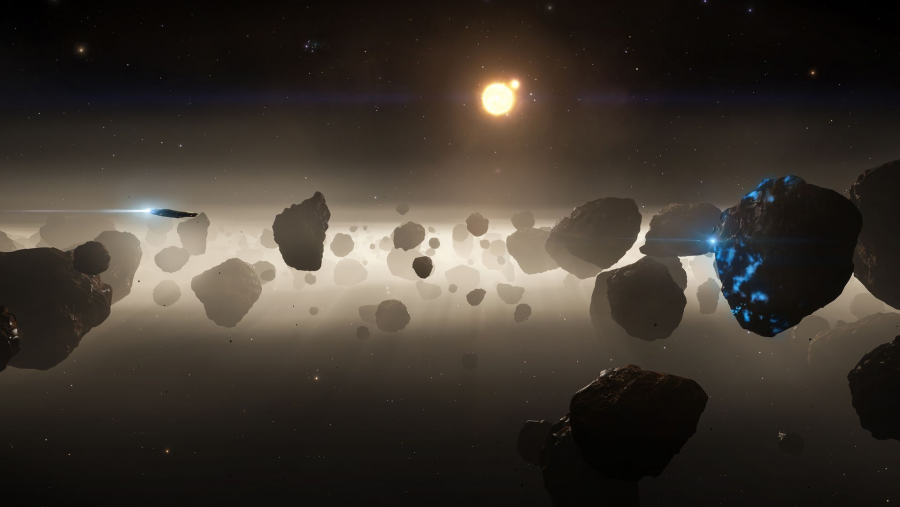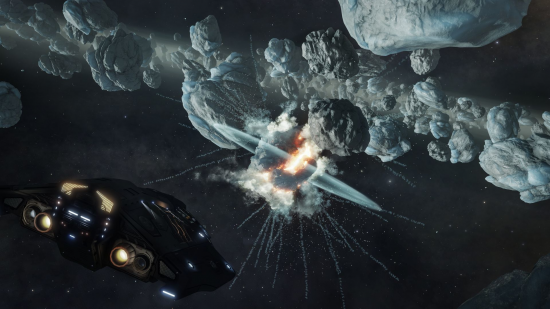The lovechild of an oil rig and a Kit Kat Chunky floats majestically through space. Against the empty backdrop of the void you wouldn’t know just how huge the bulk cruiser is – were it not for the fact that we’re viewing it through the cockpit of a far more petite vessel. Like every other ship of its class, the megaship fills the screen. Underlit with delicious orange light, it’s making us hungry. Clearly, we’re not alone.
“Calling nearby military units,” the megaship says. “We’re under attack. Please provide support.” It’s a distress call. You can tell because the lady on the intercom sounds, beneath her curt professionalism, distressed.
As it so happens, we’re flying a nearby military unit – but decide to turn the megaship down. Another voice, gruff and male, crackles in. “Glad to have you with us, commander.” A set of objectives materialise on the UI: we’re to help the pirates cripple the megaship.
“What’s really lovely is that this is utilising things that players are already doing,” executive producer Adam Woods interjects, “like datalink scanning. But we can add a little bit of direction.”
The gruff voice comes in again, suggesting we use our scanner to identify weak points on the megaship. Aha: now the cruiser’s many vulnerable fuel canisters are highlighted for the duration of the fight. We’ll need to blow up 15 of them to bring the megaship to a standstill.
A short while later, 11 are down – though we’re only responsible for a handful. “The AI faction are actually taking the opportunity to do some damage,” Woods explains. “Sometimes they go after the fighters, sometimes they go after the objectives. You could drop into the scenario twice and have quite different outcomes and experiences.”

The once-dead air is filled with communication. Kit Kat Chunky reports a loss of power to some of its decks. Our gruff new friend encourages us to keep it up. And then: “Mayday, mayday. We’re sitting ducks.”
The sequence is reminiscent of the dynamic events that Guild Wars 2 introduced to the MMO landscape – opt-in quests that made its world seem alive with activity, rather than a blank land in which everyone was playing through the same single-player RPG.
What’s exciting here is that Elite: Dangerous is alive – its newly voiced scenarios aren’t one-off scripted events, but simply the most visible layer of a vast background simulation. After the particles clear on the megaship battle, the game updates us on its rippling effects – the consequences for local governance and the economy.
“All the things you’ve seen there are things players are already used to doing,” Woods says. “But we’re giving it more meaning and clarity.”

When Frontier first stated its intention to make a space simulation, six years ago on Kickstarter, it really meant it. That simulation is not just scientific but social, and the Elite: Dangerous that exists today plays out against a backdrop of systems designed to track societal change. Minor political entities struggle for possession of star systems, aided and hindered by the actions of the players around them. Sometimes, with the concerted efforts of player groups, these NPCs become major political entities – and that change influences local law, security, and prices.
It’s a way of playing the game that offers a slow-burn, strategic satisfaction. And there’s a good chance you haven’t experienced it yet. One major goal of the game’s Beyond series of updates is to tease out the underlying simulation for more players to enjoy.
“Previously it was very sandboxy,” game director Laurence Oldham says. “You could roleplay it and you could say, ‘This is what I did’. We’re saying, ‘You don’t need to roleplay as much now’. It’s giving direction, making clear what your choices are, and also the consequences of the choices for the background simulation.”
Think about the decisions you’ve made in games: choosing the fate of BioShock’s Little Sisters, picking a companion to save in The Walking Dead, or resolving to leave a city undefended in XCOM. Each was a discrete way of boiling the background numbers down to the binaries that mattered, and that’s what Frontier is trying to do with Elite.
It’s important to note that there’s no reduction in complexity as a result – it’s still the simulation which determines the scenarios that emerge, reflecting the current state of the system you’re visiting. The aftermath of your decisions, meanwhile, will fold straight back into that unseen mass of numbers, helping to determine the scenarios of the future.
“Previously you’d drop into something and you just wouldn’t know what the factions were,” Oldham admits. “You would join one side and get it wrong. The scenarios were essentially a black box. Now you’ll see what factions are involved, and at the end of it you’ll know whether you’ve succeeded in helping or hindering them. You’ve got this whole series of tools and processes so you can logically unpick what was kind of there originally, but without any way of assessing it.”
Of course, knowing everything about how a clever machine works can take away the magic – make it seem less alive. Could it be that a game like Elite: Dangerous has thrived on a certain amount of opacity?
“I think there’s a level of that, but the challenge is how you expose something so complicated,” Oldham says. “It’s not really about being opaque, it’s how you expose it without flooding people with so much data that it becomes unmanageable through sheer volume.”
“We want as little an opaque simulation as we can,” Woods adds, “without just pumping out the raw numbers and revealing the wizard behind the curtain.”
If Frontier strikes the right balance with Beyond’s fourth chapter, it will mean the studio has built a space simulation both meaningful and real – driven by clear player choice, but left with the capacity for mystery and surprise. After all: it can’t be dangerous unless it’s a little unpredictable.

